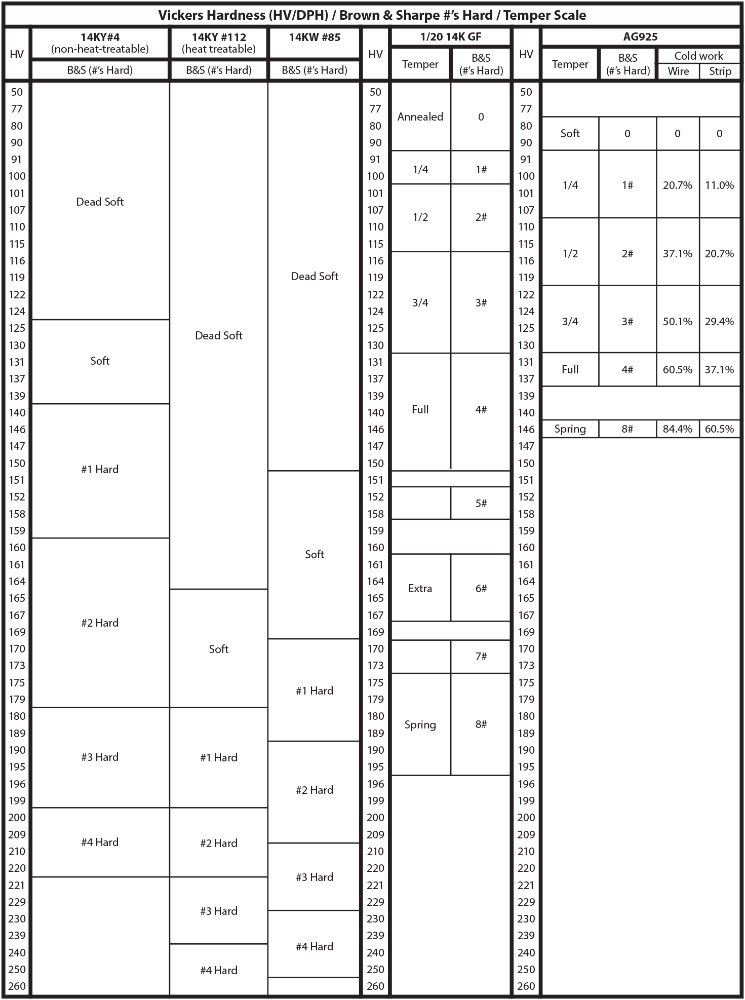US: 800-338-6157 HK: 852-2723-9148
- Contact Us
- |
- Apply for Account
- |
- Español
- |
- 中文
- |
$5,178.42
$5,178.42
$80.35
-
My Account
- Some services are not accessible on a smartphone.
- Sign In
- My Account
- Quick Order
- Order / Invoice Tracking
- JK Findings
- >Metals Guide
Metal Reference Guide
Ethical Sourcing
Recognizing the challenges associated with providing precious materials in a responsible manner, we work closely with our suppliers to ensure our jewelry is produced in the most ethical way possible.
Responsible Supply Chain of Minerals from Conflict-Affected and High-Risk Areas
To view our company policy and company management system for a responsible supply chain of minerals from conflict-affected and high-risk areas, click the link below.
Recycled Silver - As part of our sustainability program, JK Findings only buys Green Silver for use in our production process. All of our .925 silver items are nickel free.
Gold Filled
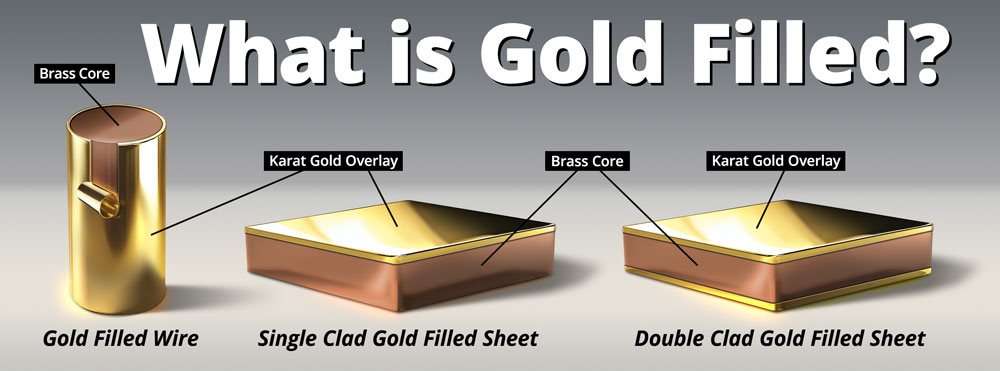
Gold filled uses a karat gold overlay which is then bonded to a brass inner core. JK Findings manufactures gold filled with 1/20th 14 karat gold, meaning, it is 5% 14 karat gold by weight with a brass inner core. We offer 1/20 14K yellow gold filled and 1/20 14K rose gold filled.
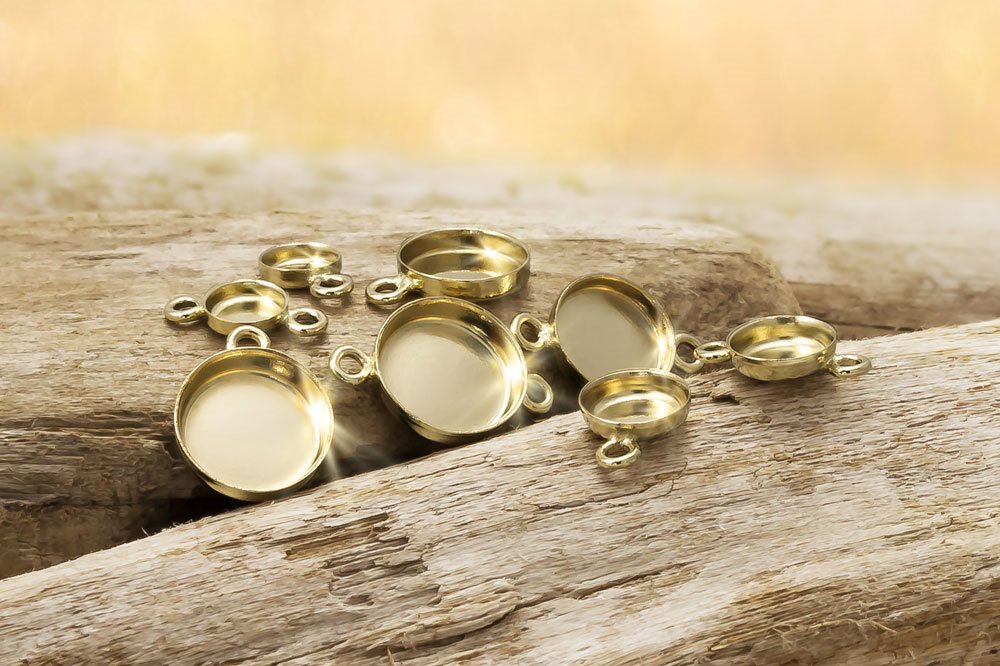
1/20 14K Gold Filled vs. 1/20 12K Gold Filled
Customers often compare 12K Gold Filled to 14K Gold Filled. Other than the difference in the karat gold composition, there are some visual differences between the two versions. Below are images of beads in both 1/20 14K Gold Filled and 1/20 12K Gold Filled for comparison.
The 4004730 Beads are made from 1/20 14KGF and the 4504730 Beads are made from 1/20 12KGF. The 12KGF beads are slightly lighter and less yellow in color than the 14KGF beads.
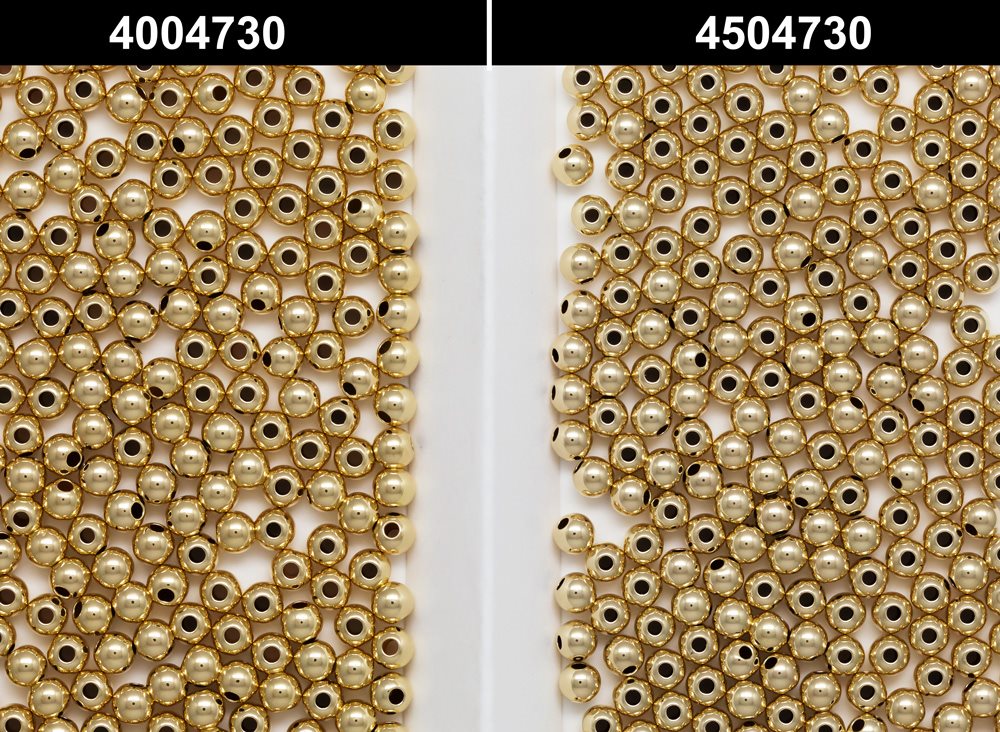
Gold Filled Wire: Our 1/20 14K Gold Filled wire has the following specifications:
- Density of 4.69 oz/cubic inch
- Annealing Temperature of 510°C with a Dwell Time of 20min - 60min depending on the size of the furnace load (hardness testing after annealing is best way to confirm annealed state)
- Melting Range of >760°C
To learn more about gold filled, view our What is Gold Filled flyer.
For more information on the difference between plating and gold filled, visit www.jvclegal.org.
For information on Stamping and Marking Regulations, visit www.mjsa.org.
U.S. Gold Filled Tolerances* | |||
|---|---|---|---|
Karatage | Minimum Purity Required | Tolerance | Minimum Purity Required with Tolerance |
1/20 14K | .0292 | .003 | .0262 |
1/20 12K | .0250 | .003 | .0220 |
1/20 10K | .0208 | .003 | .0178 |
*JK Findings adheres to U.S. Gold Filled Tolerances, which may differ from standards used in other countries.
JK Findings Gold Plating- Regular Plating vs Hamilton Plating
Customers sometimes ask us for items with a brighter yellow color which is often referred to as Hamilton Plating. Below are images of a chain sample with our Regular Plate and Hamilton Plate for comparison.
We currently offer some of our Chains, Bracelets, Lobster Claws, Trigger Clasps and Spring Rings with Hamilton plating. If you have other items that you would like us to offer in Hamilton please contact us.
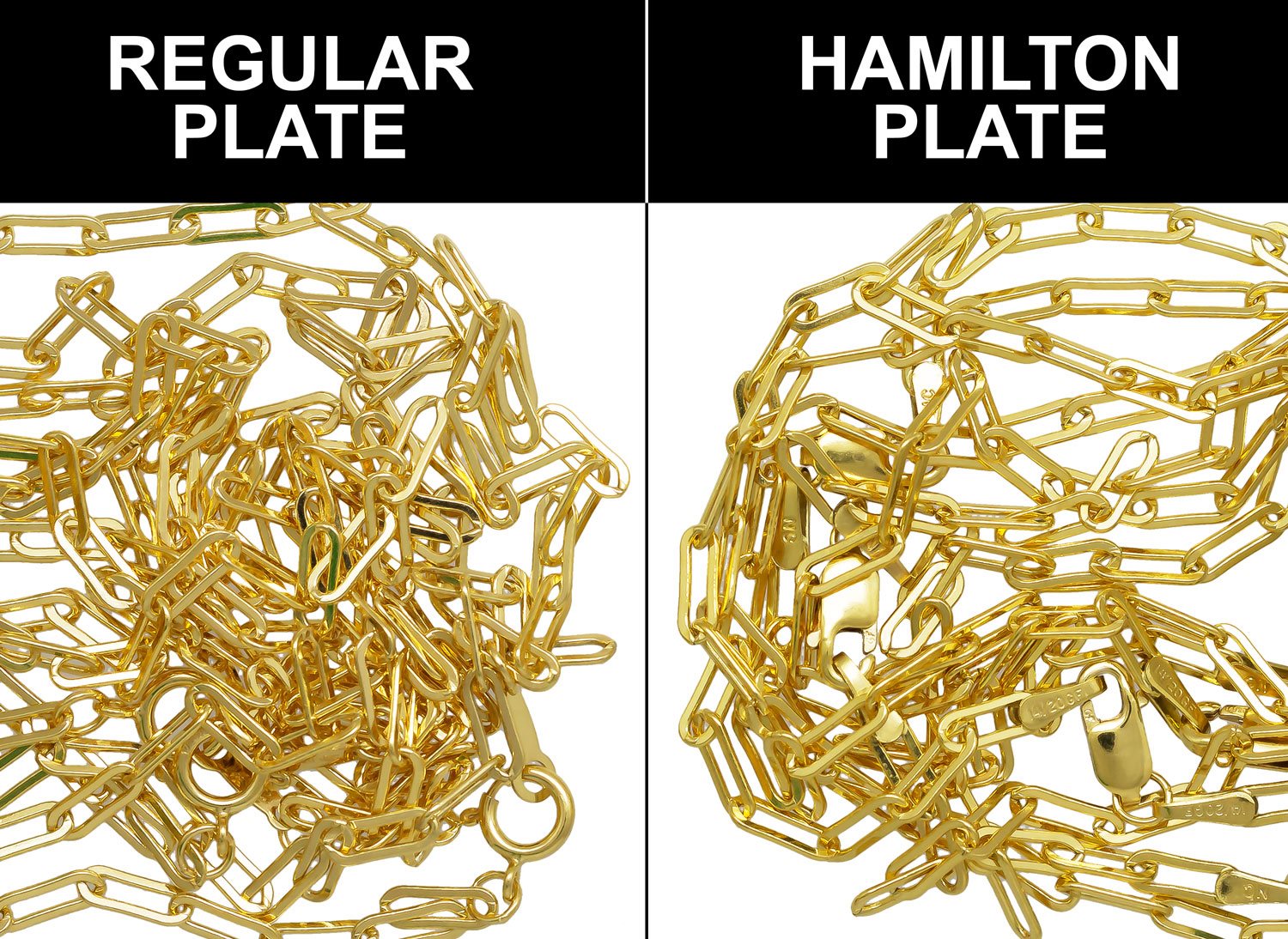
Gold
We offer 9K, 10K, 14K, and 18K gold findings in white or yellow.
Karat Weight | Gold Purity |
|---|---|
9K | .375 |
10K | .417 |
14K | .585 |
18K | .750 |
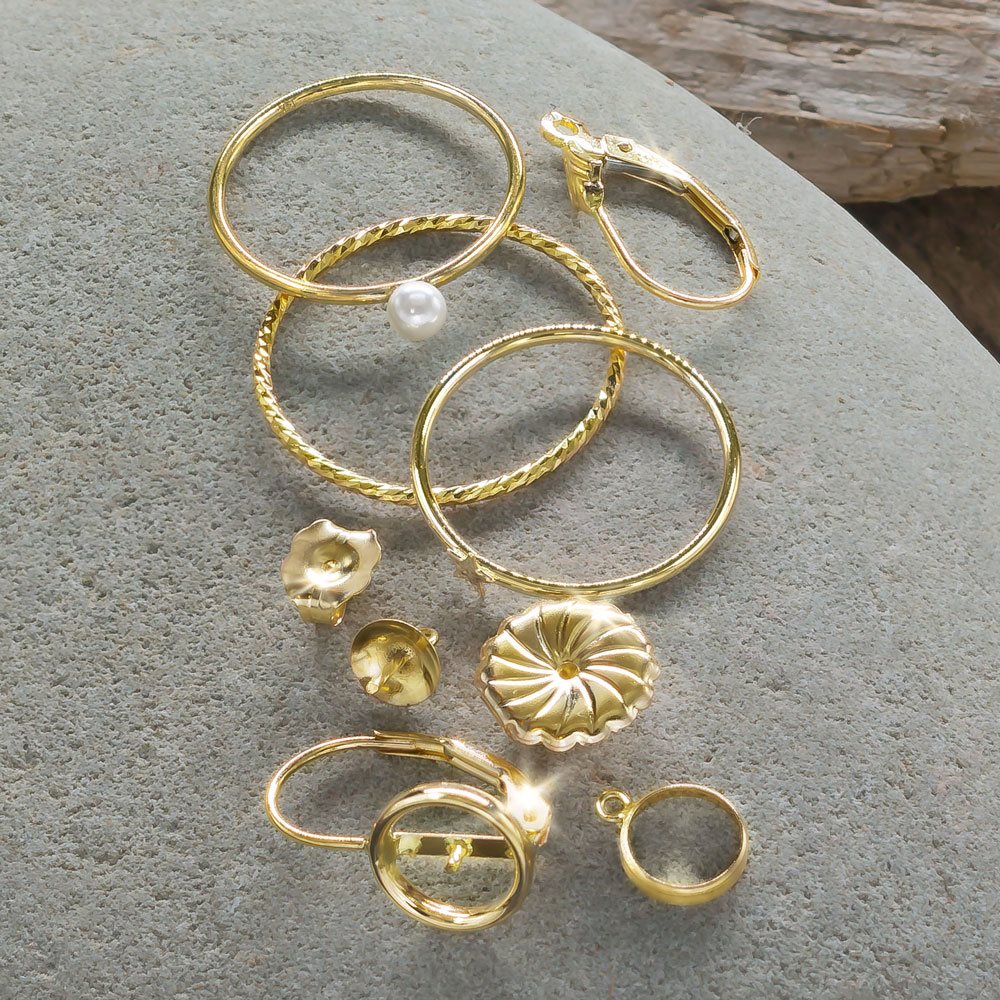
U.S. Gold Tolerances* | |||||
|---|---|---|---|---|---|
Karatage | Minimum Purity Required | Tolerance | Minimum Purity Required with Tolerance | ||
|
| without solder | with solder | without solder | with solder |
24K | .9995 | .003 | .007 | .9965 | .9925 |
18K | .7500 | .003 | .007 | .7470 | .7430 |
14K | .5833 | .003 | .007 | .5803 | .5763 |
10K | .4167 | .003 | .007 | .4137 | .4097 |
9K | .3750 | .003 | .007 | .3720 | .3680 |
*JK Findings adheres to U.S. Gold Tolerances, which may differ from standards used in other countries.
Silver
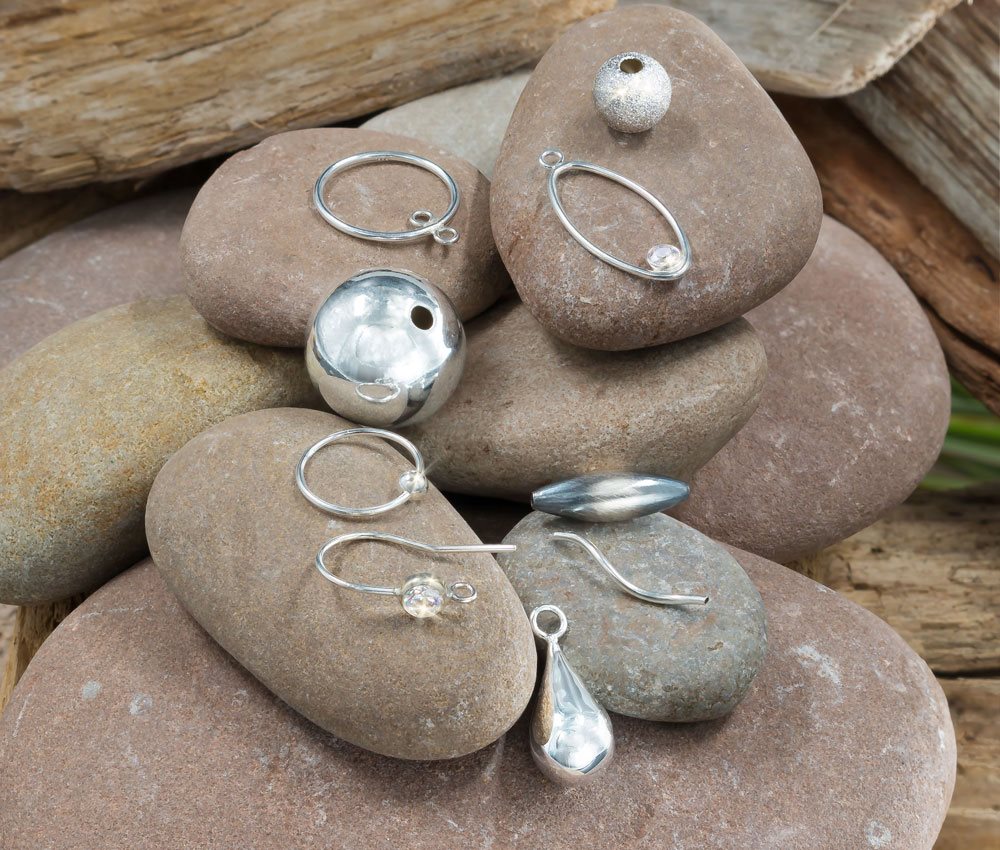
All silver items contain a minimum of .925 silver (the remaining balance is made up of copper). As part of our sustainability program, JK Findings only buys Green Silver for use in our production process. All of our .925 silver items are nickel free.
Terminology
Conversion Factors
To Go From | To | Multiply By |
|---|---|---|
Carats | Pennyweights (DWT) | 0.128603 |
Carats | Grams | 0.2 |
Feet | Millimeters | 304.8 |
Feet | Meters | 0.3048 |
Grams | Carats | 5 |
Grams | Pennyweights (DWT) | 0.6430149 |
Grams | Troy Ounces | 0.03215075 |
Inches | Millimeters | 25.4 |
Inches | Meters | 0.0254 |
Millimeters | Inches | 0.03937008 |
Millimeters | Feet | 0.00328084 |
Meters | Inches | 39.37008 |
Meters | Feet | 3.28084 |
Pennyweights (DWT) | Carats | 7.775869 |
Pennyweights (DWT) | Grams | 1.555174 |
Pennyweights (DWT) | Troy Ounces | 0.05 |
Troy Ounces | Pennyweights (DWT) | 20 |
Troy Ounces | Grams | 31.10348 |
Wire Hardness
B & S No. | Fractional | Description | Cold Work % |
|---|---|---|---|
DS | 0 | Dead Soft | Annealed |
1 | 1/4 | Soft | 10.7 |
2 | 1/2 | Medium | 20.7 |
3 | 3/4 | Med-Hard | 29.4 |
4 | Full | Hard | 37.1 |
5 |
|
| 44.1 |
6 |
| Extra Hard | 50.1 |
7 |
|
| 56.2 |
8 |
| Spring Hard | 60.5 |
9 |
|
| 65.1 |
10 |
| Extra Spring Hard | 68.6 |
11 |
|
| 72.1 |
12 |
| Special Spring Hard | 75.1 |
13 |
|
| 77.5 |
14 |
| Super Spring Hard | 80.3 |
Wire Diameter
Inch | Millimeter | Gauge |
| Inch | Millimeter | Gauge |
|---|---|---|---|---|---|---|
0.004 | 0.1 | 38 |
| 0.036 | 0.91 | 19 |
0.0045 | 0.11 | 37 |
| 0.04 | 1.02 | 18 |
0.005 | 0.13 | 36 |
| 0.045 | 1.15 | 17 |
0.0056 | 0.14 | 35 |
| 0.051 | 1.29 | 16 |
0.0063 | 0.16 | 34 |
| 0.057 | 1.45 | 15 |
0.0071 | 0.18 | 33 |
| 0.064 | 1.63 | 14 |
0.008 | 0.2 | 32 |
| 0.072 | 1.83 | 13 |
0.009 | 0.23 | 31 |
| 0.081 | 2.05 | 12 |
0.01 | 0.26 | 30 |
| 0.091 | 2.3 | 11 |
0.011 | 0.29 | 29 |
| 0.102 | 2.59 | 10 |
0.013 | 0.32 | 28 |
| 0.114 | 2.91 | 9 |
0.014 | 0.36 | 27 |
| 0.128 | 3.26 | 8 |
0.016 | 0.41 | 26 |
| 0.144 | 3.66 | 7 |
0.018 | 0.46 | 25 |
| 0.162 | 4.12 | 6 |
0.02 | 0.51 | 24 |
| 0.182 | 4.62 | 5 |
0.023 | 0.58 | 23 |
| 0.208 | 5.19 | 4 |
0.025 | 0.64 | 22 |
| 0.229 | 5.83 | 3 |
0.028 | 0.72 | 21 |
| 0.258 | 6.54 | 2 |
0.032 | 0.81 | 20 |
| 0.289 | 7.35 | 1 |
Conversion Grid to Estimate an Item Weight in Different Metals
To use this grid, locate intersection of desired metal and present metal. This number is your conversion factor. Multiply that number by actual known weight of present metal, e.g., to determine what an item that weighs 1.50 dwt in Sterling would weigh in 14K Yellow, go to 14K Yellow under Desired Metal column. Follow that row across until it intersects the Sterling column. This is your conversion factor (in this case 1.248). Then multiply that number 1.248 (conversion factor) by 1.5 (known weight) = 1.872 dwt. This would be the weight for the 14K Yellow item.
Present Metal
Desired Metal
| 10K YELLOW | 10K WHITE | 14K YELLOW | 14K WHITE | 18K YELLOW | 18K WHITE | STERLING SILVER | PLATINUM | 10% Ir PLATINUM | ALLOY | 24K FINE GOLD |
|---|---|---|---|---|---|---|---|---|---|---|---|
10K YELLOW | 1 | 1.045 | 0.885 | 0.918 | 0.743 | 0.79 | 1.105 | 0.539 | 0.537 | 1.377 | 0.599 |
10K WHITE | 0.957 | 1 | 0.847 | 0.878 | 0.711 | 0.756 | 1.057 | 0.516 | 0.514 | 1.318 | 0.573 |
14K YELLOW | 1.13 | 1.181 | 1 | 1.036 | 0.839 | 0.893 | 1.248 | 0.609 | 0.607 | 1.556 | 0.677 |
14K WHITE | 1.09 | 1.139 | 0.965 | 1 | 0.809 | 0.861 | 1.204 | 0.588 | 0.585 | 1.501 | 0.653 |
18K YELLOW | 1.347 | 1.407 | 1.192 | 1.236 | 1 | 1.064 | 1.488 | 0.726 | 0.723 | 1.855 | 0.806 |
18K WHITE | 1.265 | 1.322 | 1.12 | 1.161 | 0.94 | 1 | 1.398 | 0.683 | 0.68 | 1.743 | 0.758 |
STERLING SILVER | 0.905 | 0.946 | 0.801 | 0.83 | 0.672 | 0.715 | 1 | 0.488 | 0.486 | 1.246 | 0.542 |
PLATINUM | 1.854 | 1.938 | 1.641 | 1.701 | 1.377 | 1.465 | 2.049 | 1 | 0.996 | 2.554 | 1.11 |
10% Ir Pt. | 1.862 | 1.946 | 1.648 | 1.708 | 1.383 | 1.471 | 2.057 | 1.004 | 1 | 2.564 | 1.115 |
ALLOY | 0.726 | 0.759 | 0.643 | 0.666 | 0.539 | 0.574 | 0.802 | 0.392 | 0.39 | 1 | 0.435 |
24K Fine Gold | 1.67 | 1.745 | 1.478 | 1.532 | 1.24 | 1.32 | 1.845 | 0.901 | 0.897 | 2.3 | 1 |

